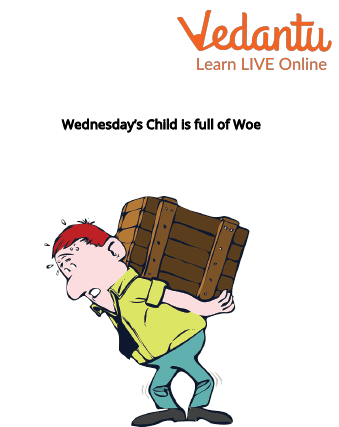The poem is about children born on different days of the week. And based on different days each child has a unique personality. In this poem, we will study about
Days of the Week
Word Meanings of Difficult Words
Different Qualities of a Person
Days of the Week
The Monday’s Child Poem talks about different days of the week. In a week, there are seven days. These seven days are Monday, Tuesday, Wednesday, Thursday, Friday, Saturday and Sunday. The day of the week starts on Monday and ends on Sunday. Most people have a holiday on Sunday, making it the best day of the week.
After having a holiday on Saturday and Sunday, children find it refreshing to go to school on Monday and meet their friends. In the poem, we will see how every day of the week is different, just like every other person is different from each other.
Monday’s Child Lyrics
The lyrics of the poem are given below. Read them aloud and then learn about the difficult words and their meanings to understand the poem better.
Monday's child is fair of face,
Tuesday's child is full of grace,
Wednesday's child is full of woe,
Thursday's child has far to go.
Friday's child is loving and giving,
Saturday's child works hard for a living,
And the child that is born on the Sabbath Day,
Is bonny and blithe and good and gay.
Monday’s Child Poem Meaning
The poem is about children born on different days of the week. Monday children are identified with attractive beauty, yet current interpretations portray them as shallow, selfish, and impulsive.

Monday’s Child
Tuesday children are connected with refinement, grace, and etiquette. Tuesday's children are associated with honesty and innocence in modern interpretations.

Tuesday’s Child
Wednesday children are known for their emotional sensitivity. They carry the weight of the world on their shoulders and have a loving and empathetic viewpoint, frequently to the point of grief for others.

Wednesday’s Child
Thursday children will have a long and prosperous life. "Far to go" is sometimes viewed as a tough road. Traditional versions, on the other hand, emphasize positive traits and talents that will push them forward in life, rather than flaws to overcome.

Thursday’s Child
Friday kids are warm-hearted and kind. In many older versions, though, anything on a Friday was considered bad luck.

Friday’s Child
Saturday kids are committed, responsible, and diligent. Saturday's children are dedicated to their profession and make significant contributions to the world.

Saturday’s Child
Sunday's children are frequently said to be "happy and smart," rather than "bonny and blithe." The Monday's child rhyme original form refers to Christmas Day rather than Sunday. Christmas (December 25th) was historically regarded as the most auspicious day of birth.

Sunday’s Child
Word Galaxy
Let us learn the meanings of some new words.
Grace - goodwill, elegant
Woe - sorrow, distress or trouble
Sabbath day - a day of religious belief when there is a holiday
Wise - having knowledge
Tips for Parents
The poem will help children remember the days of the week. It is a great way to introduce children to this new topic. They will also learn about different types of personalities that people have which make them unique.
Conclusion
The Monday’s child is a poem about different kids having different personalities. These kids are born on different days of the week. This poem is a way to help children remember the days of the week in an easier manner.


FAQs on Monday’s Child
1. Where does Thursday's child want to go?
Thursday's child will go to a lot of places. Here the lines mean that a child will achieve all that the child dreams of by working hard.
2. What do you know about Saturday's child?
The Saturday child is a hard-working child. So, they work hard to earn money and make a living.
3. How many characteristics did you learn in the poem?
In the poem, we come to know that children can be graceful, troublesome, hard-working, giving, kind, loving, good, happy, wise and beautiful.
The poem is about children born on different days of the week. And based on different days each child has a unique personality. In this poem, we will study about
Days of the Week
Word Meanings of Difficult Words
Different Qualities of a Person





